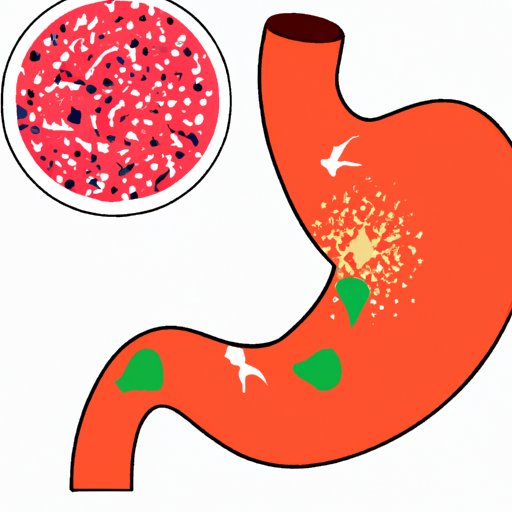
Introduction
If you’ve ever suffered from a stomach ulcer, you know how uncomfortable and painful it can be. Stomach ulcers are sores that develop in the lining of the stomach or small intestine, and they can cause symptoms like abdominal pain, bloating, and nausea. The good news is that there are many treatment options available, from natural remedies to medications to surgery. In this article, we’ll explore these options in-depth so you can find the best way to treat your stomach ulcer and get back to feeling your best.
Natural Remedies for Treating Stomach Ulcers
Stomach ulcers are often caused by a buildup of stomach acid, which can be exacerbated by certain foods and stress. To alleviate symptoms and promote healing, natural remedies can be used to soothe the digestive system. Diet changes, supplements, and lifestyle habits can all help in the healing process of stomach ulcers.
For starters, incorporating more probiotics and antioxidants in your diet can be helpful. Probiotics can improve gut health, which in turn can reduce inflammation, while antioxidants protect cells from damage caused by free radicals. Foods like yogurt, kombucha, and leafy greens can supply both. One other key factor to note is that caffeine and alcohol can disrupt digestion and irritate the stomach lining, so cutting back on both during the healing process is a good idea.
Medications for Stomach Ulcers: What You Need to Know
Medications are often prescribed for the treatment of stomach ulcers. The most commonly used medications are proton pump inhibitors (PPIs), which reduce the amount of acid produced by the stomach. PPIs are generally safe and effective and usually only have mild side effects like occasional headaches, nausea, or stomach pain. However, in rare cases, they can lead to more severe side effects like bone fractures or kidney damage. So be sure to use them only as directed by your doctor and monitor any side effects.
Diet and Lifestyle Changes to Treat and Prevent Stomach Ulcers
Diet and lifestyle changes can help prevent stomach ulcers from forming and reduce the risk of recurrence. One of the strongest recommendations by doctors for those living with stomach ulcers is to quit smoking. Smoking has been shown to increase the risk of stomach ulcers greatly, especially when combined with other risk factors like overuse of NSAIDs.
When it comes to diet, there are certain foods that should be avoided or consumed only in moderation by those with stomach ulcers. Fried, spicy, and fatty foods can all irritate the stomach lining and increase acid production, so limiting or avoiding these types of foods is helpful. Instead, focus on anti-inflammatory and nutrient-dense foods like whole grains, fruits, and vegetables that are gentle on the stomach.
Surgery for Stomach Ulcers: When Is It Necessary?
Surgery is usually only recommended for stomach ulcers that have not responded to other treatments or are accompanied by complications like severe bleeding or perforation. When surgery is necessary, the most common type is called a gastric resection and involves removing the portion of the stomach that contains the ulcer. While it is a major surgical procedure, it can be very effective in treating stomach ulcers.
Alternative Therapies for Stomach Ulcers
Alternative therapies like acupuncture and herbal remedies have been used for thousands of years to treat various ailments, including stomach ulcers. Some studies suggest that acupuncture can be an effective way to alleviate pain and inflammation associated with stomach ulcers, while herbal remedies like licorice root have been shown to have anti-inflammatory properties. It’s important to note that these treatments should always be used in conjunction with medical treatment, and patients should speak with their healthcare provider before beginning any new therapy.
Living with and Managing Stomach Ulcers
If you have a stomach ulcer, it’s important to manage it carefully to prevent complications and ensure a speedy recovery. This means taking your medication as prescribed, avoiding triggers like stress and certain foods, and seeking medical attention promptly if you experience any new symptoms. Additionally, getting plenty of rest, staying hydrated, and practicing stress-reducing activities like yoga and meditation can all help to prevent flare-ups and promote overall well-being.
Conclusion
Stomach ulcers can be painful and disruptive, but there are many treatment options available to help alleviate symptoms and promote healing. Whether you prefer natural remedies or conventional medical treatments, there are ways to manage your stomach ulcer and live a full and active life. Be sure to speak with your healthcare provider to find the best options for you and take care of yourself during the healing process.





